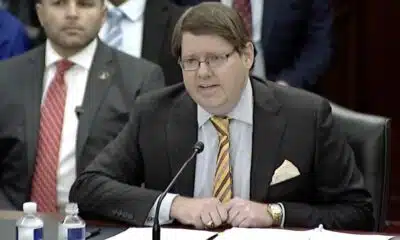News from the South - Missouri News Feed
Missouri lawmakers raise concerns about long waits in jail for court-ordered mental health care
by Clara Bates, Missouri Independent
February 17, 2025
Leaders of Missouri’s public defender system urged lawmakers on Monday to take action to reduce the growing number of people languishing in jails across the state who are in need of mental health treatment.
As of last month, 418 people were in Missouri jails waiting to be transferred to a state mental health bed, up from around 300 at this time last year. The average wait time was 14 months, with some held longer than the maximum sentence for the crime for which they were charged.
These are Missourians who were arrested but found incompetent to stand trial and ordered into treatment designed to restore their ability to have their day in court. Competency restoration generally includes medication treatment and therapy.
Missourians waiting in jail for court-ordered mental health care reaches all-time high
The Missouri House Health and Mental Health Committee spent most of an informational hearing Monday addressing the Department of Mental Health’s competency restoration program, with a presentation by Mary Fox, the director of the Missouri State Public Defender system, and Annie Legomsky, who runs the state public defense system’s holistic defense services program.
“When somebody sits in a jail unmedicated and uncared for,” Fox said, “their mental health can get worse and so bad that they can never be cured.”
Legomsky and Fox urged changes to state law to increase court referrals to community-based treatment, instead of holding those charged with nonviolent, low-level offenses in jail for months.
“If we could figure out a way to take care of more of these folks in the community,” Fox said,”we’re not only saving the state money in the competence restoration process, but we’re setting them up for success when they return to the community.”
The state can’t create beds overnight, Fox said.
“And until we can either create the community restoration and let folks receive the treatment that way or create the beds, we don’t have a quick solution to the problem,” she said.
Many of the public defender’s office’s clients who are found incompetent have schizophrenia, intellectual disabilities or are on the autism spectrum, Fox said.
The legislature in 2023 passed a law giving the department the authority to provide treatment on an outpatient basis if the person could be safely released and wasn’t charged with a dangerous felony. But the department told The Independent last month that only two people have participated in the program so far.
The state also passed a law giving the department of mental health the ability to treat people within jails. The programs have been slow to get up and running, and three counties are in their early days of getting the programs started, the department told The Independent.
Legomsky said Monday that solution is “not ideal” since “the jail is not a therapeutic environment.”
The hearing was designed to inform lawmakers, not to discuss any particular legislation.
Several of the legislators serving on the committee expressed concern with the waitlist.
“We just don’t have enough beds, that’s the answer,” said state Rep. David Dolan, a Republican of Sikeston “We don’t have enough beds, and restoration within county jails is very hit and miss.”
State Rep. Tony Harbison, a Republican of Arcadia, said small counties are footing the bill, since counties are responsible for paying for jail stays.
“Fourteen months — we’re already spending a lot of money,” he said.
Legomsky estimated that the state would save around $480 in savings per day to do community-based competency restoration as opposed to the hospital setting, not to mention the cost savings for counties currently housing those individuals in jails.
One client, Fox said, was a 78-year-old woman with dementia who tossed lit matches in a laundromat waste basket — but was held in jail for a year, waiting for a mental health bed.
State Rep. Jo Doll, a Democrat of St. Louis, responded: “Where’s the common sense part of that? How does someone, how do you all these people see this person day after day and let someone sit there for a year?”
A handful of lawmakers asked about the potential for a public-private partnership, and whether private hospitals could be included. The public defenders said that would be a question for the department of mental health.
Others asked about states that do things better. Legomsky said Washington state limits the wait time to 14 days, and recommended time limits be established in Missouri statute.
“Even closer to 30 days would be a huge improvement over 14 months,” she said.
Other recommendations included increasing funding for community crisis care, housing and substance use disorder treatment — wraparound services to help people become competent and remain healthy, Legomsky said. The state could also make community-based treatment the presumption for those charged with low-level, nonviolent offenses. She said the public defenders estimate around 80% of those on the waitlist are charged with low-level, nonviolent offenses, and could be treated on an outpatient basis.
“We’re on the same side as the prosecutors, the sheriffs, the courts,” Legomsky said. “I think we all just want to find a solution.”
YOU MAKE OUR WORK POSSIBLE.
Missouri Independent is part of States Newsroom, a nonprofit news network supported by grants and a coalition of donors as a 501c(3) public charity. Missouri Independent maintains editorial independence. Contact Editor Jason Hancock for questions: info@missouriindependent.com.
The post Missouri lawmakers raise concerns about long waits in jail for court-ordered mental health care appeared first on missouriindependent.com
News from the South - Missouri News Feed
Boeing workers on strike, cite 'unfair' contract
SUMMARY: Thousands of Boeing workers in St. Louis have gone on strike for the first time in nearly 30 years, rejecting a revised four-year contract despite offers of six-figure pay raises, $5,000 signing bonuses, and average salaries over $100,000. The union argues the contract fails to improve sick leave, vacation time, and working conditions, citing feelings of disrespect from management. Boeing, facing financial losses and talent attrition, expressed disappointment, highlighting a 40% average wage growth offer and alternative work schedules. No new negotiations are scheduled yet, and union members vow to remain on the picket line until demands are met.
On Monday, union members stood outside of Boeing’s headquarters in Berkeley, Missouri, with picket signs, expressing their frustration with management. Workers told FOX 2 that Boeing’s latest offer does not go far enough.
St. Louis News: FOX 2 covers news, weather, and sports in Missouri and Illinois. Read more about this story or see the latest updates on our website https://FOX2Now.com
Follow FOX 2 on social media:
YouTube: https://www.youtube.com/FOX2Now
Facebook: https://www.facebook.com/FOX2Now/
Twitter: https://twitter.com/FOX2Now/
Instagram: https://www.instagram.com/fox2now/
TikTok: https://tiktok.com/@fox2now
SnapChat: https://www.snapchat.com/add/fox2now
News from the South - Missouri News Feed
Former Greene County deputy arrested for stalking
SUMMARY: Joseph Schilling, a former Greene County deputy, was arrested in June 2025 for first-degree stalking and unlawful use of a weapon. Over several years, he allegedly emotionally abused a victim, harmed her pets—including killing her dogs—and made repeated threats involving his duty weapon. After the victim obtained a protection order, Schilling broke into her home, stole her phone, and was found near her workplace with loaded firearms and drug paraphernalia. Schilling was fired from the sheriff’s office in May 2025 and is held without bond. His next court appearance is scheduled for October 7, 2025.
The post Former Greene County deputy arrested for stalking appeared first on www.ozarksfirst.com
News from the South - Missouri News Feed
Celebrate National Chocolate Chip Cookie Day!
SUMMARY: National Chocolate Chip Cookie Day is celebrated with enthusiasm, highlighting the joy of baking and sharing cookies. The recipe featured uses brown butter for a rich, nutty flavor and a higher amount of brown sugar to enhance sweetness. Proper measuring and folding of flour ensure tender cookies by preventing gluten development. The chocolate chips chosen are semi-sweet to balance flavor without overpowering the cookie, unlike dark or milk chocolate. These cookies pair perfectly with milk, making them a classic treat. For more recipes and details, the featured website encourages celebrating this delicious day with friends and family.
ST. LOUIS – Today marks National Chocolate Chip Cookie Day, a celebration of one of America’s favorite treats.
Nicole Kliebert, host of ‘Noshing with Nicole’, demonstrates how to bake delicious chocolate chip cookies, offering tips on adapting recipes and sharing resources for cookie enthusiasts.
Kliebert came into the studio with some fully baked cookies, milk, and cookie dough!
For more information and recipes, visit Nicole’s website at NoshingsWithNicole.com or follow her on Instagram @Noshings_with_Nicole.
-
News from the South - Texas News Feed5 days ago
Rural Texas uses THC for health and economy
-
News from the South - Texas News Feed6 days ago
Yelp names ‘Top 100 Sandwich Shops’ in the US, several Texas locations make the cut
-
News from the South - Texas News Feed6 days ago
Released messages show Kerrville officials’ flood response
-
News from the South - Kentucky News Feed6 days ago
Harrison County Doctor Sentenced for Unlawful Distribution of Controlled Substances
-
News from the South - Louisiana News Feed6 days ago
Residents along Vermilion River want cops to help prevent land loss
-
News from the South - West Virginia News Feed6 days ago
‘Good government’ group urges blue states to back away from a redistricting arms race
-
News from the South - Alabama News Feed5 days ago
Decision to unfreeze migrant education money comes too late for some kids
-
News from the South - Louisiana News Feed6 days ago
‘Half-baked’ USDA relocation irritates members of both parties on Senate Ag panel











































